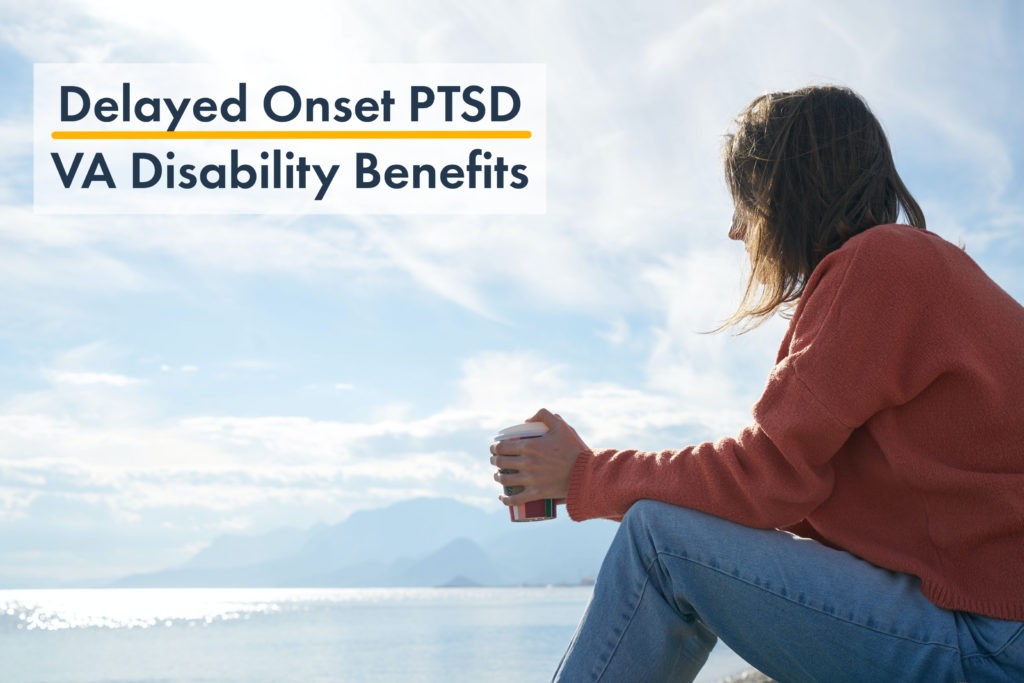Delayed Onset PTSD and VA Disability Benefits

CCK Law: Our Vital Role in Veterans Law
Many Veterans develop Post-Traumatic Stress Disorder (PTSD) as a result of service, sometimes with a delayed onset of symptoms.
Post-Traumatic Stress Disorder (PTSD) Explained
According to the Diagnostic and Statistical Manual of Mental Disorders, 5th Edition (DSM-5), post-traumatic stress disorder (PTSD) is marked by “exposure to actual or threatened death, serious injury, or sexual violence in one (or more) of the following ways:
- Directly experiencing the traumatic event(s).
- Witnessing, in person, the event(s) as it occurred to others.
- Learning that the traumatic event(s) occurred to a close family member or close friend. In cases of actual or threatened death of a family member or friend, the event(s) must have been violent or accidental.
- Experiencing repeated or extreme exposure to aversive details of the traumatic event(s) (e.g., first responders collecting human remains; police officers repeatedly exposed to details of child abuse).”
Many veterans experience PTSD stemming from events they witnessed or experienced during their military service. PTSD can be diagnosed by a medical professional, whether it be a therapist, psychiatrist, or general practitioner. It is important to note that the symptoms and severity of PTSD vary depending on the individual; however, the most common symptoms include the following:
- Re-experiencing the trauma through intrusive, distressing recollections of the event, flashbacks, and nightmares
- Emotional numbness and avoidance of places, people, and activities that are reminders of the trauma
- Increased arousal such as difficulty sleeping and concentrating, feeling jumpy, and being easily irritated and angered
PTSD can either be short-term or chronic depending on the individual and the circumstances. Furthermore, PTSD symptomatology may present immediately after the traumatic incident or later on in life. VA acknowledges three common symptom patterns in veterans with PTSD:
- Some veterans begin to have PTSD symptoms soon after the traumatic event occurs. These symptoms may last until older age.
- Other veterans do not have PTSD symptoms until later in life.
- For some veterans, PTSD symptoms can be high right after their traumatic experience, go down over the years, and then worsen again later in life.
However, VA has recently given more attention to “delayed onset PTSD.”

What is Delayed Onset PTSD?
When publishing the 3rd Edition of the DSM (DSM-3), the American Psychiatric Association included the specifier “delayed expression” to signify the onset of PTSD occurring at least six months after the traumatic event. VA acknowledges that for many veterans, memories of their wartime experiences can still be upsetting long after they served in combat. In fact, many older veterans experience PTSD symptomatology even decades following their time in service. According to VA, there are a number of reasons why PTSD symptomatology may increase with age, including:
- Retirement from work
- Onset of other medical conditions
- Regular exposure to bad news on the television and scenes from current wars
- Use of substances over time to cope with the stress
Importantly, VA created a self-report measure to help determine the severity of late-onset stress. The measure is known as the “Late-Onset Stress Symptomatology (LOSS) Scale.”
Late-Onset Stress Symptomatology (LOSS) Scale
The LOSS scale is a 44-item self-report measure that assesses late-onset stress symptomatology in male combat veterans ages 55 and older. VA states that this scale may serve as a supplement to more traditional PTSD assessment for aging combat veterans, providing more descriptive detail on the nature of presenting symptoms.
The following is an example of one of the items included in the LOSS scale: “As I get older, I get more upset when talking about the war than I used to.” The veterans are instructed to rate each item on a 5-point Likert scale ranging from “strongly disagree” (i.e., 1=strongly disagree) to “strongly agree” (i.e., 5=strongly agree). If a veteran endorses agreement on any of the items (i.e., a rating of 3 or higher), they may be re-engaging with past trauma. LOSS in and of itself does not constitute a psychiatric condition and therefore, it is not eligible for VA disability compensation. Typically, those coping with LOSS experience less severe symptomatology and less of an impact on daily functioning. However, it is possible that LOSS will progress into a delayed onset PTSD diagnosis.
Can Veterans Receive Service Connection for Delayed Onset PTSD?
It is important to note that veterans can still receive service-connected benefits for delayed onset PTSD, even if it presents years after their discharge from service. In this case, veterans should be able to demonstrate the following:
- A current diagnosis of PTSD;
- An in-service event, also known as a “stressor;” and
- A medical nexus linking the veteran’s delayed-onset PTSD to the in-service stressor.
Essentially, the process of obtaining service connection remains the same regardless of whether the veteran’s PTSD developed immediately after service or decades thereafter.
Denied VA Disability Benefits for Delayed Onset PTSD?
If you receive a denial on your claim for service connection for delayed onset PTSD, you reserve the right to file an appeal. If you would like assistance with your claim, call Chisholm Chisholm & Kilpatrick LTD at 800-544-9144 for a free case evaluation to see if we can help.
About the Author
Share this Post
